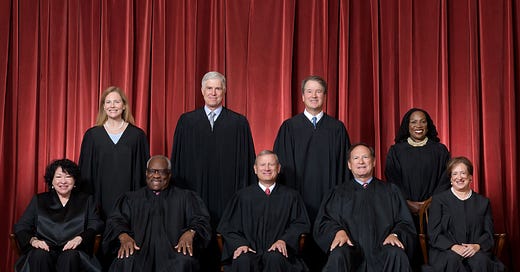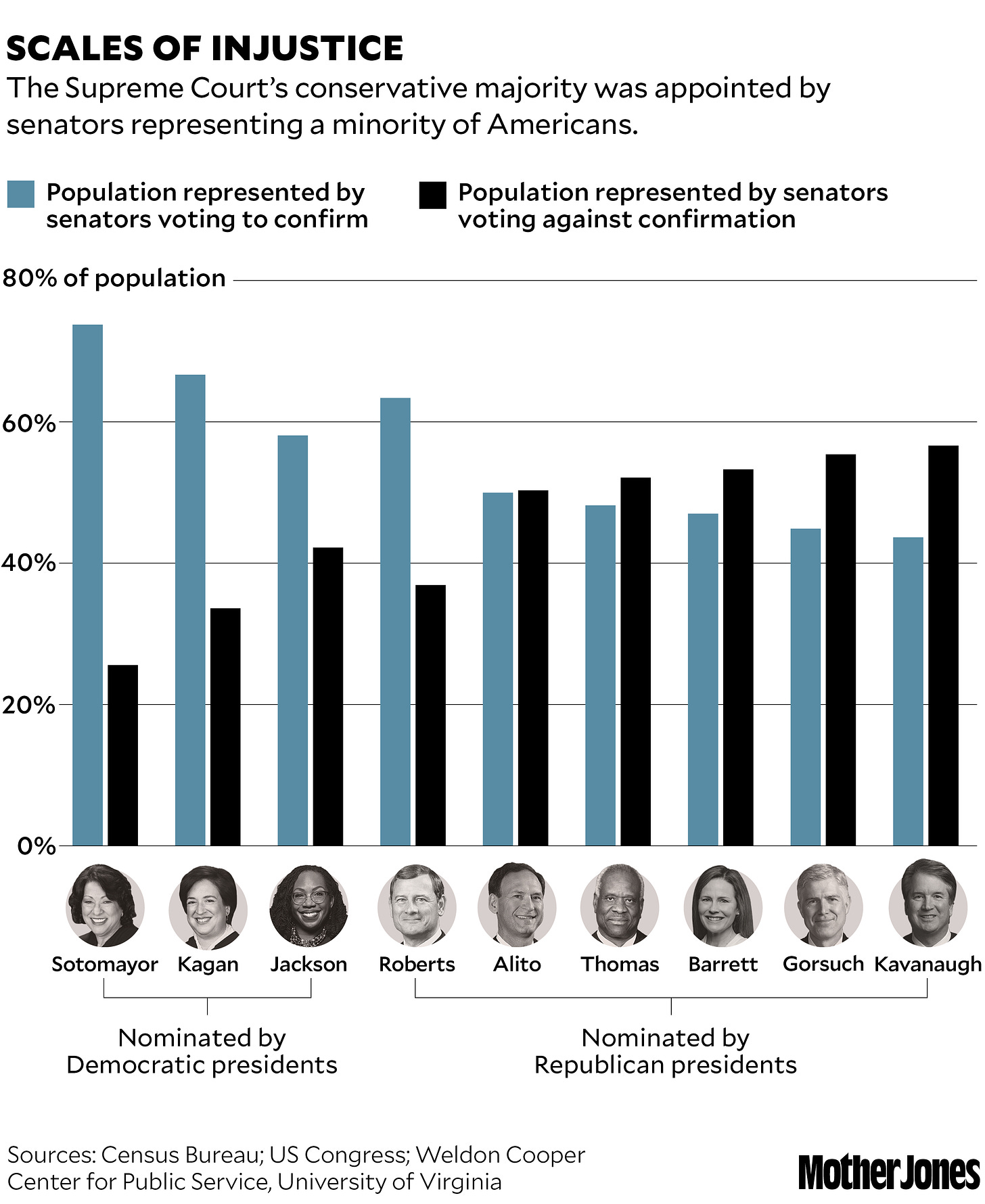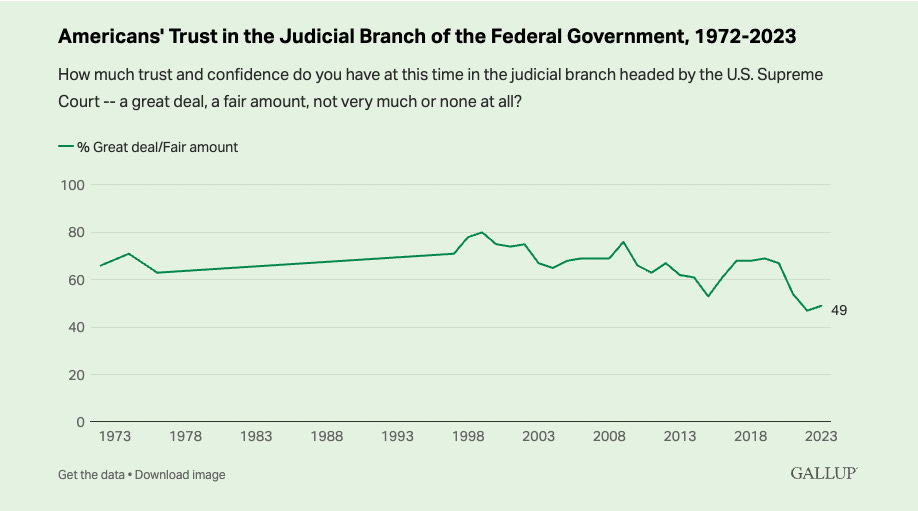BREAKING: Biden Announces Key Supreme Court Reforms
But he misses two key reforms needed to rein in a rogue MAGA court and stop Project 2025 fascism
President Biden has announced three key initiatives to reform the out of control U.S. Supreme Court, tweeting and writing a Washington Post OpEd that:
This nation was founded on a simple yet profound principle: No one is above the law. Not the President of the United States. Not a justice on the Supreme Court of the United States. So today, I'm calling for three bold reforms to restore trust and accountability to the court and our democracy.
1. No more immunity for crimes a former president committed while in office
2. Term limits for Supreme Court justices
3. A binding code of conduct for the Supreme Court
Two things are true. One, these are much needed reforms and will move the ball forward in strengthening justice, democracy, and fairness in the United States. Two, a glance at SCOTUS history and contemporary corruption demonstrates that these reforms do not go far enough, and do not do enough to stop the influence of dangerous initiatives like the fascist Project 2025. Let’s Address This.
The history of Supreme Court corruption
I’ve written before on the history of SCOTUS corruption. In summary, the U.S. Supreme Court has a long history of controversial and corrupt practices. From the 19th century, the Court has often sided with powerful interests over marginalized communities. Landmark decisions like Plessy v. Ferguson (1896) upheld racial segregation under the "separate but equal" doctrine, legitimizing systemic racism. In Lochner v. New York (1905), the Court struck down labor regulations meant to protect workers, favoring business interests instead. These rulings illustrate how the Court has historically protected entrenched power structures and perpetuated social inequalities.
And it isn’t just 19th or 20th century rulings. The legacy of Supreme Court decisions reveals a pattern of prioritizing corporate and political interests over justice in the 21st century. Citizens United v. FEC (2010), for instance, allowed unlimited corporate spending in elections, undermining democratic processes. This ruling intensified the influence of money in politics, skewing power further towards the wealthy. Shelby County v. Holder (2013) dismantled key provisions of the Voting Rights Act, leading to widespread voter suppression tactics, particularly against minorities. These historical and contemporary decisions highlight the Supreme Court’s role in exacerbating inequality and undermining democracy.
Corruption in and out of the Courtroom
And that contemporary corruption isn’t just in corrupt rulings, but in corrupt behaviors outside the courtroom with major ethical violations and conflicts of interest. For example, Justices Clarence Thomas and Samuel Alito have faced credible accusations of misconduct. Reports indicate that Justice Thomas accepted lavish gifts and failed to disclose significant financial dealings, raising questions about his impartiality. Similarly, Justice Alito has been scrutinized for his relationships with wealthy donors and involvement in cases where he had clear conflicts of interest. These ethical breaches undermine public trust in the judiciary and highlight the need for stringent ethical standards. Justice Kavanaugh faced multiple accusations of sexual abuse and harassment, yet still won confirmation.
It is no wonder that this unjust system has meant that the majority of Supreme Court justices appointed represent the vast minority of Americans. This isn’t democracy, and it isn’t sustainable.
As a result, we suffer a judiciary that is more beholden to political interests than to principles that Americans cherish. The current Court’s draconian rulings make clear that while President Biden’s proposed reforms are a good start, they do not go far enough.
Contemporary unjust rulings
The current Supreme Court has issued several rulings that threaten the foundations of American democracy and civil rights. I’ve written on this before, but as a summary some of the most grotesque rulings include:
Presidential Immunity: Expanding criminal immunity for former presidents, which paves the way for unchecked executive power and dictatorship.
Bribery Legalization: Overturning a bribery corruption conviction has effectively legalized bribery, eroding the democratic accountability of elected officials.
Criminalizing Homelessness: Allowing the criminalization of homelessness, which ultimately pushing vulnerable people into prison systems.
Decriminalizing Insurrection: Undermining laws against obstructing official proceedings, effectively decriminalizing actions like the January 6 insurrection.
Denying Abortion Care: The Court’s refusal to protect abortion rights exacerbates maternal mortality, especially in states with severe abortion bans.
Unchecked Corporate Pollution: Stripping regulatory power from environmental agencies worsens the climate crisis and public health.
These are but a snapshot of the increasingly extreme rulings the current MAGA court continues to make. Unless we bring about additional reforms, this will only get worse. Here’s what two of those critical reforms look like.
The Additional Reforms We Need
To ensure we can protect our democracy, President Biden should add at least the following two reforms to his list of Supreme Court reforms:
Expand the Court: Expanding the Court aligns with historical precedent. As documented by the Supreme Court itself:
The number of Justices on the Supreme Court changed six times before settling at the present total of nine in 1869.
As many changes as our nation went through from March 4, 1789 (the date SCOTUS was established) to 1869 (the year of the last SCOTUS change in number of justices), it surely has gone through as many or more significant changes since then—clearly justifying further expansion. Likewise, one reason we arrived at nine justices in 1869 is our nation then had nine federal districts. Now, the United States has 13 federal districts. Precedent mandates that we remain consistent and expand to at least 13 Supreme Court seats. In other words, not expanding SCOTUS to at least 13 is the actual contradiction to SCOTUS precedent.
Appoint an independent Judicial Council for SCOTUS: If we accept that no person is above the law, then indeed we need an enforcement mechanism to hold Supreme Court Justices accountable. Justice Elena Kagan has an interesting idea — an independent judicial council made up of lower federal judges. This is, in my view, a brilliant idea. The council would comprise of already vetted and confirmed judges, legal scholars who already know the law, and scholars who know their rulings will result in precedent potentially applicable to themselves should they be appointed to a future Supreme Court. Moreover, this council could also go through a rotation system with term limits, just as members of Congress serve on committees during their time in office.
These changes are critical to protecting our democracy and restoring the faith and trust of the American people in the Supreme Court—which is currently at historically lows.
Conclusion
The Supreme Court's recent decisions and its history of controversial rulings represent a grave threat to democracy and human rights. Judicial reform is imperative to safeguard our democratic institutions and ensure justice for all Americans. While President Biden’s proposed reforms are a step in the right direction, they do not go far enough to protect our democracy from the onslaught of fascism. While no system is perfect, we can better protect ourselves with an expanded Supreme Court to align with historical precedent and better reflect the will of the American people, and by enacting an Independent Judicial Council to actually enforce the Supreme Court code of conduct. Without these reforms, the U.S. risks further entrenchment of autocracy and systemic abuse.
For additional detailed discussions and insights, see my previous articles on SCOTUS







Well done, Rashid, as usual. Only #FascistGOP will argue with any of this. #CorruptSCOTUS #ExpandTheCourt
I said a while back that we should expand the SCOTUS to 13 to match the number of Federal districts. The problem is that it will never get through the Senate because you need 60 votes!